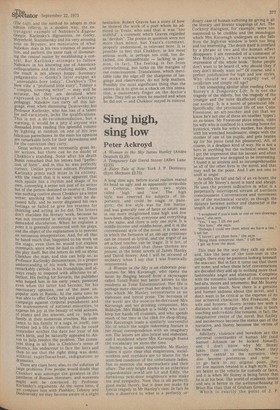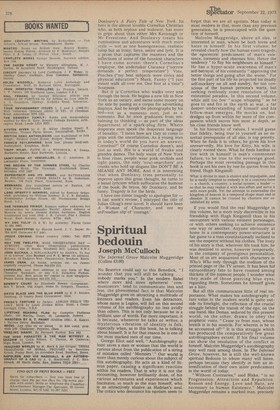Sing high, sing low
Peter Ackroyd
.A Woman in the Sky James Hanley (Andre Deutsch £2.25) A 'Temporary Life David Storey (Allen Lane £2.25) A Fairy Tale of New York J. P. Donleavy (Eyre Methuen £2.75)
A long time ago, before social realism reared its head as ugly and as apparently invincible as Cerberus, there were two styles
called high ' and 'low.' The high style was reserved for subjects of importance, and could be tragic or panegyric; the low style was for low matter, and was generally one of farce or satire. MIL in our more enlightened time high and low have been displaced, everyone and everything is the same, and there is only one style. It is middle-income and middle-brow, and it is the conventional style of the novel. It is also one in which the fantasies of an old-age pensioner can be treated as lyrical, and the angst of an art-school teacher can be tragic. It IS not, of course, accidental that these themes are present in the latest novels of James Hanley and David Storey. And I will be accused of snobbery when I say that I was frantically uninterested.
A Woman in the Sky is an elaborate postmortem for Mrs Kavanagh, who opens the novel by flinging herself from a skyscraper called Total' Point but better known to the residents as Total Extermination. Her life is perhaps more obscure than her death, but it is this which Mr Hanley reconstructs in an elaborate and lyrical prose. The heroines of the novel are the soon-to-be-deceased Mrs Kavanagh and her drinking companion, Mrs Biddulph. Mrs Biddulph is a biddy who can't keep her hands off counters, and who spends much of her time in the clink for shop-lifting. Mrs Kavanagh leads a similarly uneventful life, of which the single redeeming feature is her ritual correspondence with an imaginary son. The letters are also lyrical and elaborate, and I wondered where Mrs Kavanagh found the vocabulary let alone the time.
Society is, as usual, responsible. Mr Hanley makes it quite clear that magistrates, socialworkers and corridors are to blame for the wretched condition of the unfortunate ladies. Not to mention the supermarkets and their allure. The only bright sparks in an otherwise unpardonable world are Lil and Eddy, the fortuitous next-door neighbours who make tea and sympathy. Now this is all perfectly good social theory, but it does not make for lyrical tragedy in Mr Hanley's vein. In fact he does a disservice to what is a perfectly or dinary case of human suffering by giving it all the literary and literate trappings of Art. The Cockney dialogues, for example, were too mannered to be credible and the monologue which Mrs Kavanagh undergoes as she falls from the high-rise window is both too long and too interesting. The death itself is overlaid by a phrase or two and the human effect disappears. I am reminded of a comment of Mrs Biddulph's, which summarises my impression of the whole book: "Some people don't want to be heard of, why should they if they don't bloody want to?" Of course, and a perfect justification for high and low styles. Why should we make tragedy out of recidivism and simple old age?
I felt something similar after reading David Storey's A Temporary Life. It is not the tragedy of the elderly, but the tragedy of the younger and the more disaffected ciphers of our society. It is a novel of provincial life. Specifically, the provincial life of one Colin Freestone, an art-teacher and (so that we know he's not one of these art-teacher 'types') an ex-boxer. Mr Freestone plays tennis, visits his wife who is confined to a nursing home for hysterics, visits his wife's mother, has dinner with his wretched headmaster, sleeps with the mother of one of his pupils, and gets beaten up for his pains (and his pleasures). All, of course, in a deadpan kind of way. He is not a hero in anything but the technical sense, but I got the impression that his laconic and often brutal manner was designed to be interesting. I found it as aimless and as incomprehensible as all of the other lives in the novel, and that may well•be the point. And I am not one to scoff at angst.
As befits the fall and fall of an ex-boxer, the style of Mr Storey's novel is hard and abrupt. He uses the present indicative in what is a perpetually interrupted stream of northern consciousness. Conversations and movement are of the mechanical variety, as though the distance between author and character is the length of a puppet's string:
"I wondered if you'd look at one or two drawings I have," she says.
"Yes," I say. I lift the pad.
"Not here," she says. "Perhaps I could see them when we have a rest."
I tell her.
"I haven't got them here," she says.
"Bring them tomorrow, then," I tell her.
I get up from the stool.
This may be the way they talk up north and, like the beat of the tom-tom in the jungle, there may be passions lurking beneath the staccato. But in fact it turns out that there are none, and when these brief conversations are decoded they add up to nothing more than fashionable angst and alienation. Complete with the romantic landscape of chimneys and bed-sits, moors and tenements. But Mr Storey protests too much. Now there is a genuine and human sadness about the novel, and I don't want to be critical at the expense of its one achieved character: Mrs Freestone, the wife and hysteric. Storey invests her with a distance and a margin of pain that is both touching andcredible.She remains, in fact, the imaginative centre of the novel. But futility and incoherence become the status quo of the narrative, and Storey becomes the victim of his mood.
Adultery, violence and boredom are the universal constituents of human life (said Samuel Johnson as he kicked himself), and I don't know why Mr Storey. takes them so seriously. When they become central to the narrative, they also become portentous and trite — to go back to my original point, they are low matters treated in a high style. They are better as the vehicle for comedy or farce, and it is when Mr Storey is being funny that he is at his best. The world of students, tennis and sex is better in the weltansehauung of Brian Rix than that of Graham Greene,
Which is exactly the point of J. P.
Donleavy's A Fairy Tale of New York. Its hero is the almost lovable Cornelius Christian who, as both orphan and widower, has more to gripe about than either Mrs Kavanagh or Mr Freestone. And Donleavy treats his ruminations and adventures with much more ,style — not as one homogeneous, realistic lump but as irony, farce, satire and lyric. It is a prose that captures the manners and the inflections of some of the funniest characters I have come across: there's Cornelius's employer, the undertaker Clarence ("sorrow demands a perfect temperature") Vine, Peaches ("my best subjects were civics and physical education") Musk, Fanny ("I just meant walk all over me. One foot at a time")
Sourpuss. -•
But it is Cornelius who walks over and through the book. He begins a new life in New York as an ostiary, and earns some money on the side by posing as a corpse for advertising displays. And he keeps the photographs by his bed—not as a memento mori, just as a ,rtn-mlento. But he soon graduates trom embalming to thinking — as part of the ideas department of a spark-plug firm. Where desperate men speak the desperate language of banality: "I mean how are they to come to grips with the uncertainties, As a young man in today's world do you have an answer, Cornelius?" Of course Cornelius doesn't, and just as well. His is a world of freaks and grandes dames. The holy water of New York is blue rinse, people wear pink orchids and tight pants, the only 'soul-searchers' are cranks who hold up slogans like DON'T BE A MEANIE ANY MORE. And it is interesting that when Donleavy tries personally to improve upon this great thought, he turns to a banal lyricism which suffocates the humour of the book. Be brave, Mr Donleavy, and be funny. Tragedy is for the birds.
I have one minor tragedy to apologise for — in last week's review, I mistyped the title of Julian Gloag's new novel. It should have been A Woman of Character, and not my unFreudian slip of 'courage.'



































 Previous page
Previous page